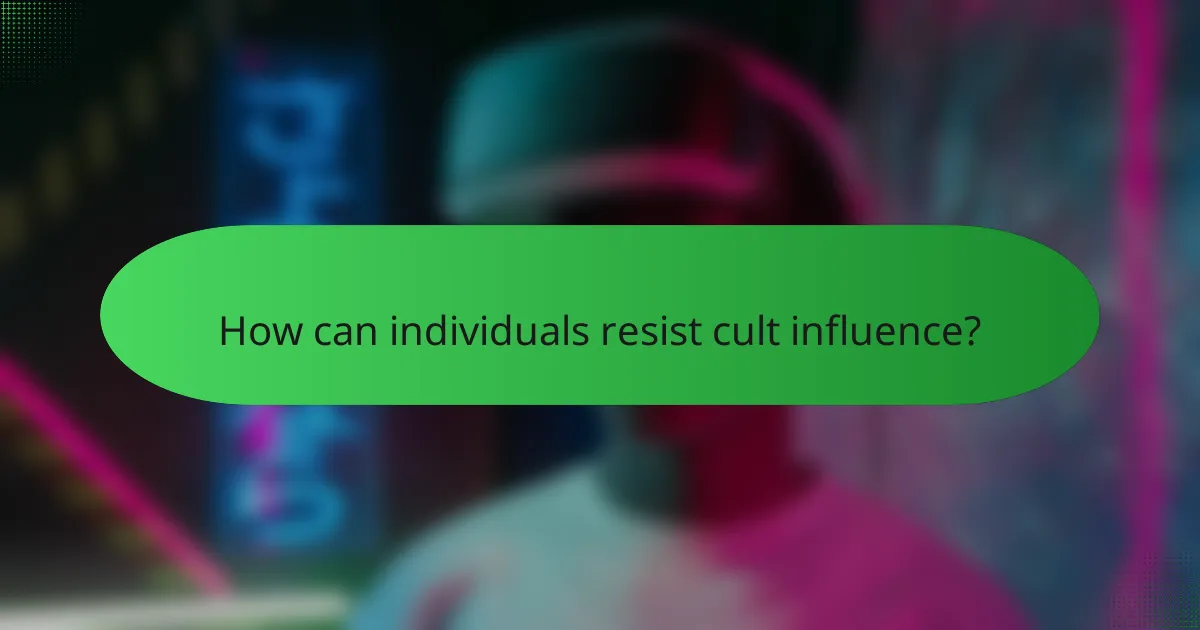Cult leaders wield a unique blend of charisma and manipulation to cultivate devoted followings, often exploiting emotional vulnerabilities to foster a deep sense of belonging. Through various brainwashing techniques, they instill unwavering loyalty and dependence, making it challenging for individuals to question or leave the group. By promoting extreme ideologies, these leaders create a compelling narrative that provides followers with a strong sense of identity and purpose, further entrenching their control.

How do cult leaders attract charismatic followings?
Cult leaders attract charismatic followings through a combination of persuasive communication, fostering a sense of belonging, and exploiting emotional vulnerabilities. These strategies create a powerful bond between the leader and their followers, often leading to unwavering loyalty.
Use of persuasive communication
Cult leaders often employ persuasive communication techniques to captivate their audience. They use emotionally charged language, compelling narratives, and repetition to reinforce their messages. This approach can create a sense of urgency and importance around their ideology, making followers feel as though they are part of something significant.
Additionally, leaders may utilize charismatic speaking styles and body language to enhance their appeal. This can include eye contact, gestures, and vocal modulation that draw listeners in and make them feel personally connected to the leader’s vision.
Creating a sense of belonging
To attract followers, cult leaders create an environment that fosters a strong sense of belonging. They often establish a close-knit community where members feel valued and accepted. This can involve exclusive rituals, shared experiences, and group activities that reinforce the idea of unity among followers.
By promoting a collective identity, leaders make individuals feel that they are part of a greater purpose. This can be particularly appealing to those who may feel isolated or disconnected from mainstream society, as the cult provides a supportive network that meets their emotional needs.
Exploiting emotional vulnerabilities
Cult leaders are adept at identifying and exploiting the emotional vulnerabilities of potential followers. They often target individuals who are experiencing personal crises, such as loss, loneliness, or uncertainty. By offering solutions and a sense of security, leaders can effectively draw these individuals into their fold.
Once involved, cults may manipulate these vulnerabilities further, using guilt, fear, or dependency to maintain control. This can create a cycle where followers feel increasingly reliant on the leader for emotional support and guidance, making it difficult for them to leave the group.

What brainwashing techniques do cult leaders employ?
Cult leaders often use a variety of brainwashing techniques to manipulate their followers. These methods can create a strong sense of loyalty and dependence, making it difficult for individuals to leave the group or question its beliefs.
Isolation from outside influences
Isolation is a key tactic used by cult leaders to control their followers. By separating members from family, friends, and society, leaders create an environment where outside perspectives are minimized. This can involve physical separation, such as relocating members to remote areas, or emotional isolation, where members are discouraged from communicating with outsiders.
This isolation fosters a dependency on the group for emotional support and validation, making it harder for individuals to critically assess the cult’s teachings. Over time, members may become more entrenched in the ideology, viewing any outside information as a threat.
Repetition of core beliefs
Cult leaders frequently use repetition to reinforce their core beliefs among followers. By consistently repeating key messages and doctrines, leaders ensure that these ideas become ingrained in the minds of their members. This can occur through daily meetings, chants, or written materials that emphasize the same themes.
Repetition not only strengthens belief but also creates a sense of community among members, as they share a common understanding. This technique can make it challenging for individuals to question or deviate from the group’s ideology, as the repeated messages become a central part of their identity.
Sleep deprivation tactics
Sleep deprivation is another method employed by cult leaders to weaken the mental resistance of followers. By limiting sleep, leaders can impair cognitive function and critical thinking, making individuals more susceptible to suggestion. This can be achieved through long meetings, demanding schedules, or enforced early rising.
As fatigue sets in, members may find it harder to think independently or challenge the group’s teachings. The resulting disorientation can lead to increased compliance and a stronger adherence to the cult’s beliefs, as individuals seek reassurance and guidance from their leaders.

What extreme ideologies do cult leaders promote?
Cult leaders often promote extreme ideologies that can include apocalyptic beliefs, anti-establishment views, and utopian visions. These ideologies serve to create a strong sense of identity and purpose among followers, often leading to manipulation and control.
Apocalyptic beliefs
Apocalyptic beliefs center around the idea that a catastrophic event will occur, leading to the end of the world as we know it. Cult leaders use these beliefs to instill fear and urgency, convincing followers that they must prepare for this impending doom. This can include predictions of natural disasters, societal collapse, or divine intervention.
For example, some groups may claim that only their members will be saved during an apocalypse, reinforcing loyalty and obedience. Followers might be encouraged to abandon their previous lives and invest all their resources into the cult’s activities, often under the guise of preparation.
Anti-establishment views
Anti-establishment views promote a deep distrust of government, mainstream society, and established institutions. Cult leaders exploit this sentiment by positioning themselves as outsiders who possess the “truth” that the world is blind to. This can create a strong us-versus-them mentality among followers.
Such ideologies often encourage followers to reject societal norms and laws, which can lead to isolation from family and friends. Cults may advocate for radical actions against perceived oppressors, further solidifying the group’s cohesion and commitment to the leader’s vision.
Utopian visions
Utopian visions present an idealized society that the cult claims to be creating or can help followers achieve. These visions often include concepts of communal living, shared resources, and a harmonious existence free from societal ills. Cult leaders use these ideals to attract individuals seeking purpose and belonging.
However, the reality of these utopian promises often falls short, as the leaders may exploit followers for labor or financial gain. It’s crucial for individuals to critically assess the feasibility of such visions and the methods used to attain them, as they can lead to significant personal sacrifices.

How can individuals resist cult influence?
Individuals can resist cult influence by developing critical thinking skills, fostering strong personal connections, and understanding the psychological tactics used by cult leaders. Awareness and education are key to recognizing and countering manipulative behaviors.
Recognizing manipulation tactics
Understanding manipulation tactics is crucial for resisting cult influence. Common techniques include love bombing, where new members are showered with affection to create dependency, and isolation, which cuts off outside support. By identifying these tactics, individuals can maintain their autonomy and critical perspective.
Another tactic is the use of fear and guilt to control behavior. Cult leaders often instill a sense of impending doom or moral obligation to keep followers compliant. Recognizing these emotional triggers can help individuals detach from the cult’s influence.
Building strong personal networks
Establishing a robust personal network is vital for resisting cult influence. Friends and family can provide emotional support and alternative viewpoints that challenge cult ideologies. Regular communication with trusted individuals helps maintain perspective and reinforces personal values.
Participating in community activities or support groups can also strengthen these networks. Engaging with diverse groups encourages open dialogue and critical discussions, making it harder for cults to isolate individuals.
Educating about psychological control
Education about psychological control methods can empower individuals to resist cult influence. Learning about concepts like cognitive dissonance, where conflicting beliefs create discomfort, can help individuals recognize when they are being manipulated. Resources such as books, workshops, or online courses can provide valuable insights.
Additionally, understanding the psychological stages of cult recruitment can prepare individuals to spot red flags early. Awareness of these processes allows for informed decisions and a greater ability to resist coercive tactics.

What are the psychological effects of cult membership?
Cult membership can lead to significant psychological effects, including altered perceptions of self and reality, emotional distress, and long-lasting trauma. Members often experience a profound shift in their identity and worldview, driven by the group’s ideology and manipulative practices.
Loss of personal identity
Individuals in cults frequently undergo a loss of personal identity as they adopt the group’s beliefs and values. This transformation can lead to a diminished sense of self, where personal goals and desires are overshadowed by the cult’s agenda.
Members may find themselves conforming to the group’s expectations, often sacrificing their individuality in the process. This can manifest as a reliance on the cult for validation and purpose, making it difficult to reintegrate into society after leaving.
Increased anxiety and fear
Cult environments often foster heightened anxiety and fear among members. This can stem from constant surveillance, strict rules, and the threat of punishment for dissenting thoughts or behaviors.
Members may experience chronic stress due to the pressure to conform and the fear of ostracism or harm if they question the group’s teachings. This anxiety can persist even after leaving the cult, affecting relationships and daily functioning.
Long-term trauma and recovery
The trauma associated with cult membership can have long-lasting effects, including PTSD, depression, and difficulty trusting others. Many former members struggle with the emotional scars left by their experiences, which can hinder their ability to rebuild their lives.
Recovery often requires professional support, such as therapy or support groups, to address the psychological damage and help individuals reclaim their identities. It is crucial for survivors to engage in self-care and seek environments that promote healing and understanding.
